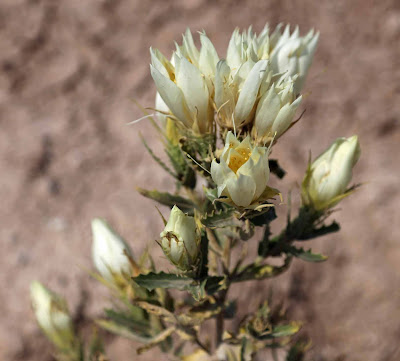Badlands –
The scenic loop through the Badlands is only about 40 miles long, but it is PACKED with the most spectacular rock formations. The rock formations are really fossil beds of mammals, crustaceans and vegetation that flourished 27 to 34 million years ago.
The weathering and erosion continues at the
rate of about 1 inch per year, occasionally revealing more fossils.
Both the Indians and the French called the area
the Badlands, largely because it is difficult to travel through, and there is no
water. There is a small amount of plant
life. Frank Lloyd Wright in 1935 said ..
“ What I saw gave me an indescribable sense of mysterious elsewhere, a distant
architecture, an endless supernatural …"
It might be one of the quietest places we’ve
ever been, no observable wildlife, no noisy bugs and no chirping birds. The sky was magnificently clear with
virtually no ambient light.
The rock formations are striped with delicate
bands of color. It’s funny how we all
react to these landscapes differently.
Kris would stay for a month to paint, tom was ready to move on.
We hiked up to the top of these hills, keeping
an eye out for creatures, looking off in all directions and down on or waiting
home.
Wind cave is one of the worlds largest caves,
and continued exploration reveals more miles of cavern every year. Currently, 140 miles of passageways have been
surveyed.It was formed in the limestone layers underlying the area.
It is known for the rare boxwood formations,
containing 80% of the world’s known boxwood formation. Boxwood is made of fragile, thin calcite fins
resembling honeycombs.
We took a 1 ½ tour, conducted by a Park Ranger
who is a member of the Lakota Indian tribe.
She explained that Wind Cave is a sacred location to the Lakota people because the origin of the lakota people took place at Wind Cave. The Lokota origin story, tells how the Lokata peoples
first emerged from the underworld through this opening into Wind Cave.
 The cave ‘breathes’ through the opening she is
standing in front of. She hold a ribbon
to demonstrate air pulling into the cave (indicating a high pressure atmosphere). When there is a low pressure atmosphere, the
cave exhales. Cave researchers can estimate
the size of the cave based on air flows during changing air pressure. There is instrumentation in the cave
measuring this. Based on the
calculations, the cave is larger than that which has been currently
mapped.
The cave ‘breathes’ through the opening she is
standing in front of. She hold a ribbon
to demonstrate air pulling into the cave (indicating a high pressure atmosphere). When there is a low pressure atmosphere, the
cave exhales. Cave researchers can estimate
the size of the cave based on air flows during changing air pressure. There is instrumentation in the cave
measuring this. Based on the
calculations, the cave is larger than that which has been currently
mapped.
Jewel Cave
Believed to be the third largest cave in the
world with 165 miles of passageways mapped.
As with Wind Cave, exploration continues, with 9 more miles mapped this
year alone. There is some speculation
that Wind Cave and Jewel Cave may connect, although they are about 25 miles
away from each other.
Jewel Cave is very different from Wind Cave in
that it has very little Boxwood, and quite a lot of ‘nailhead’ calcite crystals
lining the walls.
We took a 1 ½ hour tour that took us over 723 stairs. Much of the tour trail in the cave is
constructed on aluminum boardwalks.
The most spectacular Cave 'bacon' we've ever seen. It was longer than 10 feet
This was a good cave tour, but we are done with caves. With the exception of Carlsbad, we have toured the biggest and best caves in the U.S.
Back above ground and moving on to Custer Sate Park, our trusty home is taking very good care of us
Night Night
Next Post : Custer State Park





















No comments:
Post a Comment